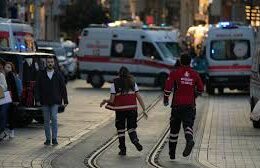Thousands gathered at a rally in Istanbul on Saturday to express their support for the opposition leader, Kemal Kilicdaroglu.
With one week to go until Turkey’s presidential and legislative elections, the latest polls are showing him with a slight lead on the current President, Recep Tayyip Erdogan.
Polls are suggesting it will be a tight competition for both the presidential and parliamentary races, which will determine not only who will lead Turkey but also what role it may play on the international scene.
Many wonder whether Kilicdaroglu can defeat the veteran president, who is the country’s longest-serving leader and has repeatedly defeated the other statesman in the past.
The opposition candidate has earned the support of the other five leaders of the six-party opposition alliance, and Mayors of two major cities, Istanbul and Ankara.
The coalition, known as the Nation Alliance, has vowed to reverse the democratic backsliding and crackdowns on free speech and dissent under Erdogan, seeking to scrap the powerful presidential system he introduced that concentrates vast authority in his hands.
The end of the Erdogan era?
President Recep Tayyip Erdogan has been in power for 20 years and has used his charisma to secure multiple victories.
However, this election on May 14th may prove to be the most challenging for him, as it comes as Turkey faces economic turmoil and high inflation.
The president has been aggressively slashing interest rates as part of his unorthodox economic approach. The cuts sent inflation to a 24-year peak above 85% in October before it dipped to near 50% in March. The ensuing cost-of-living crisis has gripped Turkish households and squeezed earnings and savings.
Furthermore, the Turkish leader is also facing backlash over his office’s reaction to a devastating earthquake in February, which killed over 48,000 people in the country and brought down over 100,000 buildings and homes.
Erdogan’s government was criticized for its poor response to the disaster and for failing to prepare the country for a large-scale quake. He himself has conceded that there were shortcomings in the early days of the February earthquake but insisted the situation was quickly brought under control.
Some also are questioning whether Erdogan would agree to a peaceful transfer of power should he lose. In 2019, he challenged the results of a local election in Istanbul after his ruling party lost the mayoral seat there, only to suffer an even more embarrassing defeat in the second balloting.
Source: Euronews









